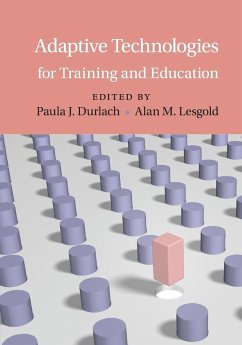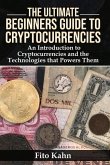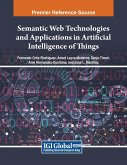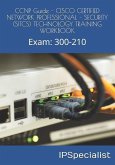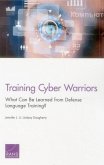Adaptive Technologies for Training and Education
Herausgeber: Durlach, Paula J.; Lesgold, Alan M.
Adaptive Technologies for Training and Education
Herausgeber: Durlach, Paula J.; Lesgold, Alan M.
- Broschiertes Buch
- Merkliste
- Auf die Merkliste
- Bewerten Bewerten
- Teilen
- Produkt teilen
- Produkterinnerung
- Produkterinnerung
The purpose of this volume is to provide an overview of the latest advancements in computer-based training.
Andere Kunden interessierten sich auch für
![The Ultimate Beginners Guide to Cryptocurrencies: An Introduction to Cryptocurrencies and the Technologies That Powers Them Volume 1 The Ultimate Beginners Guide to Cryptocurrencies: An Introduction to Cryptocurrencies and the Technologies That Powers Them Volume 1]() Fito KahnThe Ultimate Beginners Guide to Cryptocurrencies: An Introduction to Cryptocurrencies and the Technologies That Powers Them Volume 118,99 €
Fito KahnThe Ultimate Beginners Guide to Cryptocurrencies: An Introduction to Cryptocurrencies and the Technologies That Powers Them Volume 118,99 €![Semantic Web Technologies and Applications in Artificial Intelligence of Things Semantic Web Technologies and Applications in Artificial Intelligence of Things]() Semantic Web Technologies and Applications in Artificial Intelligence of Things246,99 €
Semantic Web Technologies and Applications in Artificial Intelligence of Things246,99 €![CCNP Guide - CISCO CERTIFIED NETWORK PROFESSIONAL - SECURITY (SITCS) TECHNOLOGY TRAINING WORKBOOK: Exam: 300-210 CCNP Guide - CISCO CERTIFIED NETWORK PROFESSIONAL - SECURITY (SITCS) TECHNOLOGY TRAINING WORKBOOK: Exam: 300-210]() Ip SpecialistCCNP Guide - CISCO CERTIFIED NETWORK PROFESSIONAL - SECURITY (SITCS) TECHNOLOGY TRAINING WORKBOOK: Exam: 300-21025,99 €
Ip SpecialistCCNP Guide - CISCO CERTIFIED NETWORK PROFESSIONAL - SECURITY (SITCS) TECHNOLOGY TRAINING WORKBOOK: Exam: 300-21025,99 €![Web Technologies Web Technologies]() Uttam Kumar RoyWeb Technologies42,99 €
Uttam Kumar RoyWeb Technologies42,99 €![Training Cyber Warriors Training Cyber Warriors]() Jennifer J LiTraining Cyber Warriors26,99 €
Jennifer J LiTraining Cyber Warriors26,99 €![Evolution and Structure of the Internet Evolution and Structure of the Internet]() Romualdo Pastor-SatorrasEvolution and Structure of the Internet91,99 €
Romualdo Pastor-SatorrasEvolution and Structure of the Internet91,99 €![The Internet in the Workplace The Internet in the Workplace]() Patricia WallaceThe Internet in the Workplace44,99 €
Patricia WallaceThe Internet in the Workplace44,99 €-
-
-
The purpose of this volume is to provide an overview of the latest advancements in computer-based training.
Hinweis: Dieser Artikel kann nur an eine deutsche Lieferadresse ausgeliefert werden.
Hinweis: Dieser Artikel kann nur an eine deutsche Lieferadresse ausgeliefert werden.
Produktdetails
- Produktdetails
- Verlag: Cambridge University Press
- Seitenzahl: 380
- Erscheinungstermin: 12. Mai 2015
- Englisch
- Abmessung: 254mm x 178mm x 20mm
- Gewicht: 713g
- ISBN-13: 9781107583177
- ISBN-10: 1107583179
- Artikelnr.: 43118566
- Herstellerkennzeichnung
- Produktsicherheitsverantwortliche/r
- Europaallee 1
- 36244 Bad Hersfeld
- gpsr@libri.de
- Verlag: Cambridge University Press
- Seitenzahl: 380
- Erscheinungstermin: 12. Mai 2015
- Englisch
- Abmessung: 254mm x 178mm x 20mm
- Gewicht: 713g
- ISBN-13: 9781107583177
- ISBN-10: 1107583179
- Artikelnr.: 43118566
- Herstellerkennzeichnung
- Produktsicherheitsverantwortliche/r
- Europaallee 1
- 36244 Bad Hersfeld
- gpsr@libri.de
1. Adaptive educational systems Valerie Shute and Diego Zapata-Rivera; 2.
Adaptive expertise as acceleration of future learning: a case study Kurt
VanLehn and Min Chi; 3. Adaptive hypermedia for education and training
Peter Brusilovsky; 4. Progress in assessment and tutoring of lifelong
learning skills: an intelligent tutor agent that helps students become
better help seekers Vincent Aleven, Ido Roll and Kenneth R. Koedinger; 5.
Student modeling and intelligent tutoring beyond coached problem solving
Cristina Conati; 6. Emotions during learning with autotutor Sidney D'Mello
and Art Graesser; 7. Lifelong learner modelling Judy Kay and Bob
Kummerfeld; 8. Training decisions from experience with decision-making
games Cleotilde Gonzalez; 9. Ill-defined domains and adaptive tutoring
technologies Collin Lynch, Kevin D. Ashley, Niels Pinkwart and Vincent
Aleven; 10. Individualized cultural and social skills learning with virtual
humans H. Chad Lane and Bob Wray; 11. Emergent assessment opportunities: a
foundation for configuring adaptive training environment Phillip M. Mangos,
Gwendolyn Campbell, Matthew Lineberry and Ami E. Bolton; 12. Semantic
adaptive training John Flynn; 13. Speech and language processing for
adaptive training Diane J. Litman; 14. The art and science of developing
intercultural competence W. Lewis Johnson, LeeEllen Friedland, Aaron Watson
and Eric Surface; 15. Practical issues in the deployment of new training
technology Alan Lesgold; 16. A model-driven instructional strategy: the
benchmarked experiential system for training (BEST) Georgiy Levchuk, Wayne
Shebilske and Jared Freeman; 17. Exploring design-based research for
military training environments Marie Bienkowski; 18. Conclusion Paula
Durlach and Alan Lesgold.
Adaptive expertise as acceleration of future learning: a case study Kurt
VanLehn and Min Chi; 3. Adaptive hypermedia for education and training
Peter Brusilovsky; 4. Progress in assessment and tutoring of lifelong
learning skills: an intelligent tutor agent that helps students become
better help seekers Vincent Aleven, Ido Roll and Kenneth R. Koedinger; 5.
Student modeling and intelligent tutoring beyond coached problem solving
Cristina Conati; 6. Emotions during learning with autotutor Sidney D'Mello
and Art Graesser; 7. Lifelong learner modelling Judy Kay and Bob
Kummerfeld; 8. Training decisions from experience with decision-making
games Cleotilde Gonzalez; 9. Ill-defined domains and adaptive tutoring
technologies Collin Lynch, Kevin D. Ashley, Niels Pinkwart and Vincent
Aleven; 10. Individualized cultural and social skills learning with virtual
humans H. Chad Lane and Bob Wray; 11. Emergent assessment opportunities: a
foundation for configuring adaptive training environment Phillip M. Mangos,
Gwendolyn Campbell, Matthew Lineberry and Ami E. Bolton; 12. Semantic
adaptive training John Flynn; 13. Speech and language processing for
adaptive training Diane J. Litman; 14. The art and science of developing
intercultural competence W. Lewis Johnson, LeeEllen Friedland, Aaron Watson
and Eric Surface; 15. Practical issues in the deployment of new training
technology Alan Lesgold; 16. A model-driven instructional strategy: the
benchmarked experiential system for training (BEST) Georgiy Levchuk, Wayne
Shebilske and Jared Freeman; 17. Exploring design-based research for
military training environments Marie Bienkowski; 18. Conclusion Paula
Durlach and Alan Lesgold.
1. Adaptive educational systems Valerie Shute and Diego Zapata-Rivera; 2.
Adaptive expertise as acceleration of future learning: a case study Kurt
VanLehn and Min Chi; 3. Adaptive hypermedia for education and training
Peter Brusilovsky; 4. Progress in assessment and tutoring of lifelong
learning skills: an intelligent tutor agent that helps students become
better help seekers Vincent Aleven, Ido Roll and Kenneth R. Koedinger; 5.
Student modeling and intelligent tutoring beyond coached problem solving
Cristina Conati; 6. Emotions during learning with autotutor Sidney D'Mello
and Art Graesser; 7. Lifelong learner modelling Judy Kay and Bob
Kummerfeld; 8. Training decisions from experience with decision-making
games Cleotilde Gonzalez; 9. Ill-defined domains and adaptive tutoring
technologies Collin Lynch, Kevin D. Ashley, Niels Pinkwart and Vincent
Aleven; 10. Individualized cultural and social skills learning with virtual
humans H. Chad Lane and Bob Wray; 11. Emergent assessment opportunities: a
foundation for configuring adaptive training environment Phillip M. Mangos,
Gwendolyn Campbell, Matthew Lineberry and Ami E. Bolton; 12. Semantic
adaptive training John Flynn; 13. Speech and language processing for
adaptive training Diane J. Litman; 14. The art and science of developing
intercultural competence W. Lewis Johnson, LeeEllen Friedland, Aaron Watson
and Eric Surface; 15. Practical issues in the deployment of new training
technology Alan Lesgold; 16. A model-driven instructional strategy: the
benchmarked experiential system for training (BEST) Georgiy Levchuk, Wayne
Shebilske and Jared Freeman; 17. Exploring design-based research for
military training environments Marie Bienkowski; 18. Conclusion Paula
Durlach and Alan Lesgold.
Adaptive expertise as acceleration of future learning: a case study Kurt
VanLehn and Min Chi; 3. Adaptive hypermedia for education and training
Peter Brusilovsky; 4. Progress in assessment and tutoring of lifelong
learning skills: an intelligent tutor agent that helps students become
better help seekers Vincent Aleven, Ido Roll and Kenneth R. Koedinger; 5.
Student modeling and intelligent tutoring beyond coached problem solving
Cristina Conati; 6. Emotions during learning with autotutor Sidney D'Mello
and Art Graesser; 7. Lifelong learner modelling Judy Kay and Bob
Kummerfeld; 8. Training decisions from experience with decision-making
games Cleotilde Gonzalez; 9. Ill-defined domains and adaptive tutoring
technologies Collin Lynch, Kevin D. Ashley, Niels Pinkwart and Vincent
Aleven; 10. Individualized cultural and social skills learning with virtual
humans H. Chad Lane and Bob Wray; 11. Emergent assessment opportunities: a
foundation for configuring adaptive training environment Phillip M. Mangos,
Gwendolyn Campbell, Matthew Lineberry and Ami E. Bolton; 12. Semantic
adaptive training John Flynn; 13. Speech and language processing for
adaptive training Diane J. Litman; 14. The art and science of developing
intercultural competence W. Lewis Johnson, LeeEllen Friedland, Aaron Watson
and Eric Surface; 15. Practical issues in the deployment of new training
technology Alan Lesgold; 16. A model-driven instructional strategy: the
benchmarked experiential system for training (BEST) Georgiy Levchuk, Wayne
Shebilske and Jared Freeman; 17. Exploring design-based research for
military training environments Marie Bienkowski; 18. Conclusion Paula
Durlach and Alan Lesgold.

